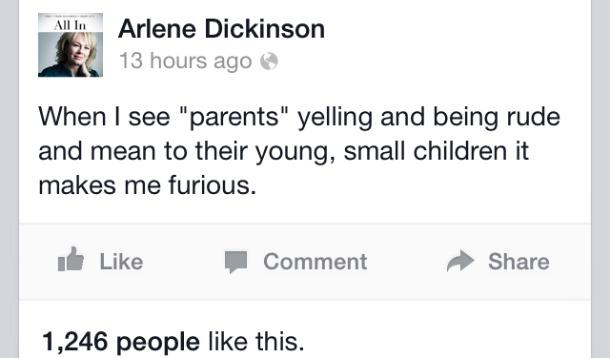
I discovered this post on Arlene Dickinson’s Facebook page. As is common with this type of remark, the comments were divided between women (I’d say 95% of the commenters were women) saying, “I agree!” and “You have no right to judge others—stop it!”
It didn’t take long for me to learn that Dickinson had four children in the span of eight years before her twenty-seventh birthday. I imagine she knows what it feels like to be sleep-deprived, exhausted, caring for four little ones and putting her needs last. I also learned that Dickinson lost those four children in a custody battle with her husband during their divorce. Wow, I can’t imagine how that must have felt.
I can empathize with Dickinson’s feeling in her Facebook post, although I don’t experience it as being “furious” because I have learned that the typical reasons a mother (or father) is yelling, being rude, and mean to her young children are any of the following:
She hasn’t learned what “affect-management” or “self-regulation” mean and doesn’t know how to experience big feelings without letting those hurt others—she doesn’t have a calm-down plan
She was treated harshly as a child
She feels lonely or isolated
She feels unable to use her words to get the help she needs
She might have deep wounds from years past that are not healed
She hasn’t learned strategies to getting those little ones to cooperate
She doesn’t know how to fill her children’s attachment tanks—likely because hers is running on empty, too
She feels overwhelmed, exhausted and not sure how she’s going to make it to the end of the day
If a person is yelling and being rude, the defensive part of the brain is likely in charge so it’s best not to try and give advice. Shouts or swears will likely get directed to you! In order to try and activate the rational part of other person’s mind (I explain a bit more about that in this article), start with empathy. You can try to encourage rationality, but please know that might not happen. Know when to wish the person well and walk away.
When I see a mom at the end of her rope, trying to manage a screaming child, I usually say, “Hey. I’ve so been in your shoes. How about I put the groceries into your van so you can hug that cute girl of yours.” This way I am offering help and directing her to be kind to her wailing child (without coming across as judgmental).
I’ve learned not to ask a question like, “Can I help?” The response will often be, “No thanks—I’ve got it.” I pause after my specific offer of help to give the mom the opportunity to say, “no.” Usually, the mom sighs and says, “Thanks.” I continue with validation like, “Hey no problem. I’ve had days like this, too.” I know I’m not going to change her parenting ways in that moment but perhaps feeling seen and heard in the moment is what she needs most.
So, Arlene Dickinson, if you happen to be reading this, I’ll be happy to talk to you about creating community centers to provide education and support for parents to learn alternatives to yelling and being rude. That is what they need more than our criticism—we are all in this together.
If you are looking for free parenting resources to help reduce yelling and frustration, I invite you over to my Facebook page where I provide tips, strategies and support.